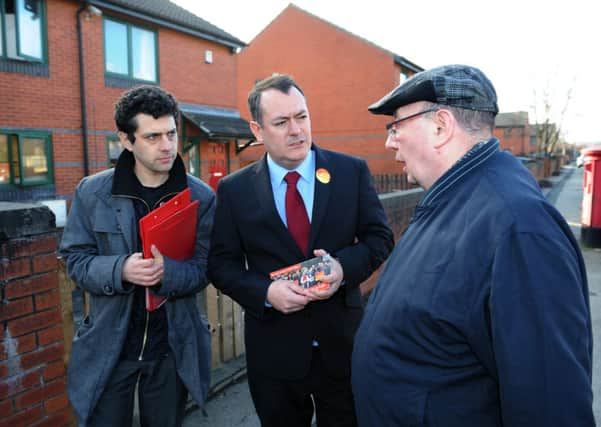Public’s mood turning against coalitions says Labour chief


But Labour vice-chairman Michael Dugher claimed the public’s mood had turned against coalitions.
The Prime Minister is reportedly considering explicitly ruling out going into coalition again if the next election produces another inconclusive result and Len McCluskey, the general secretary of the Unite union, has urged Ed Miliband to do the same.
Advertisement
Hide AdAdvertisement
Hide AdMr Dugher said: “The people who will decide the outcome of the next General Election will be the public. It’s for them to determine what result we have next time.
“All I can say is that Ed Miliband and the Labour Party will be fighting to win that election and to win a majority to deliver a big program for big changes in this country.
“On the doorstep I have found no love affair with coalitions when I’ve been knocking on doors.
“I think there was a brief moment for about quarter of an hour in the rose garden of Number 10 where the public were told this would be different when Cameron and Clegg came together putting aside their party interests for the sake of the country.
Advertisement
Hide AdAdvertisement
Hide Ad“What they have seen in the subsequent months and years is horsetrading, squabbling, broken promises.”
The Barnsley East MP was speaking as he met voters at a pub in Goole, part of a tour around the country to hear views as Labour formulates its strategy for fighting the next election which has also seen him canvassing in Leeds.
Labour’s approach has been described as a “35 per cent strategy”, suggesting the party is focused on getting out its core voters and attracting disenchanted Liberal Democrats to score a narrow win rather than securing broad support.
“Our strategy is targeting 106 marginal seats, that’s our strategy. To deliver those we need, I don’t know what the percentage is, but we need more than 40 per cent.
Advertisement
Hide AdAdvertisement
Hide Ad“We are targeting constituencies across the whole of the country. When Ed Miliband talks about One Nation he’s not just talking about his approach to governing the country, about representing everyone, that’s our strategy in terms of the next election.
“It’s how we are going to win, by reaching out to every corner of the country to people who had voted Labour in the past but didn’t vote for us last time because they felt we had become out of touch.”
Mr Dugher’s comments come as his party approved far-reaching reforms that change Labour’s historic links with trade unions following controversy over Unite’s involvement in the selection of a Labour candidate in Falkirk last year.
Since Mr Miliband unveiled Labour’s promise of a freeze on energy bills at its annual conference last year, the party has undeniably enjoyed success in moving debate over the economy away from headline figures and on to the cost of living.
Advertisement
Hide AdAdvertisement
Hide AdBut with signs of consumer confidence rising and headline inflation falling below the Bank of England’s two per cent target, questions are growing over whether what Labour calls the “cost of living crisis” will still resonate with voters as strongly in 14 months time.
“I think that’s David Cameron’s gamble,” said Mr Dugher. “There is a bubble in Westminster and in that bubble there is a view I think of David Cameron and George Osborne that everything is basically going to plan, its going great, that out there the economy is booming, people are in work and doing well and that is just not the reality facing families.
“Now if you spend time actually on the doorstep, if you spend time out of that Westminster bubble, you can see that.”